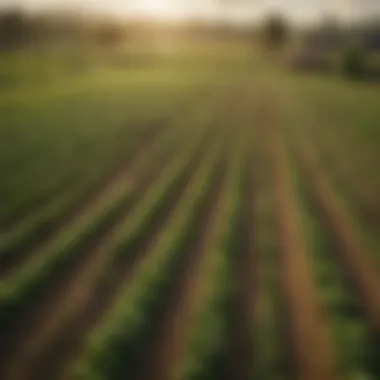Finding Your Ideal Organic Hobby Farm for Sale


Intro
Finding the right organic hobby farm can be a fulfilling journey, blending personal interests with sustainable agricultural practices. The increasing demand for organic produce and the desire for self-sufficiency are drawing many people to consider this lifestyle. A hobby farm not only provides a means to connect with nature but also supports local communities and promotes environmental stewardship.
In this guide, we will navigate the essential factors to consider while seeking an organic hobby farm for sale. This includes defining personal goals, examining property features, and analyzing market trends. It is also pivotal to ensure compliance with organic certification standards and to understand the financial aspects involved.
Embarking on this agrarian pursuit involves challenges, and this article will present strategies to address potential obstacles. By examining these elements thoroughly, we aim to provide valuable insights and practical information to assist future hobby farmers in making informed decisions.
Intro to Organic Hobby Farming
Organic hobby farming represents a growing field that attracts a diverse group of individuals seeking a connection to nature, a sustainable lifestyle, or simply a productive outlet for creativity. This introduction to the topic outlines important elements to consider when venturing into this agrarian pursuit. The article emphasizes that organic hobby farming is not merely about landownership; it encompasses values, practices, and community ties that could lead to fruitful personal and environmental outcomes.
Understanding Organic Farming Principles
At its core, organic farming prioritizes ecological balance and biodiversity. It adheres to methods that maintain soil health, reduce synthetic inputs, and promote animal welfare. Familiarizing oneself with these principles is essential for anyone interested in establishing a hobby farm. Growing food organically can lead to not only exceptional produce but also a way to engage more deeply with the environment.
Moreover, organic farming promotes sustainability by limiting chemical inputs that can contaminate the land and waterways. Understanding topics such as crop rotation, composting, and the benefits of cover crops can significantly impact farm productivity. This knowledge enhances not only farm yield but also the overall health of the ecosystem.
The Allure of Starting a Hobby Farm
The appeal of starting a hobby farm lies in the blend of relaxation and the potential for productivity. Many individuals yearn for the simplicity of life close to nature, and a hobby farm can fulfill that desire. Spending time on a farm can offer mental respite from urban life, along with the satisfaction of growing one's own food. This interest can also extend into community involvement, creating opportunities for education about organic farming practices.
People are increasingly aware of where their food comes from. A hobby farm allows for personal control over food sources while contributing to local food systems. Such endeavors often lead to friendships and networks with fellow farmers, thus expanding communal support.
In summary, as you delve deeper into the world of organic hobby farming, recognizing these principles and the allure they present is essential. Tips and insights on finding the ideal organic hobby farm will guide you through making informed decisions for a rewarding farming experience.
Defining Goals for Your Hobby Farm
Defining clear goals for your hobby farm is crucial. Such objectives shape every decision, from the location to the type of crops or livestock you choose to raise. Without well-defined goals, the process can become chaotic and potentially unfulfilling. Goals ensure that your hobby farm aligns with your personal aspirations and financial realities. They aid in creating a vision that is not only realistic but also inspiring.
Personal and Financial Objectives
When considering personal and financial objectives, take time to reflect on what you desire from your hobby farm. For some, it might be about growing fresh produce for their family. For others, it could mean creating a side income to improve financial stability. Identifying these motivations determines the direction you take when evaluating potential farms.
Financial objectives should include not just the initial purchase price, but ongoing expenses such as maintenance, taxes, and utilities. Understanding your budget also helps in negotiating purchase prices effectively. Keep in mind that organic farming may involve additional costs like organic seeds and certification processes.
Key Considerations:
- Set realistic expectations regarding profitability
- Assess your willingness to invest time and effort
- Understand local market demands
- Consider potential returns on investment
"Clear goals are a compass. They guide your decisions and help you stay on the right track."
Desired Farm Features and Layout
Desired farm features and layout are equally important. What kind of farming activities do you envision? An efficient layout can enhance productivity. It helps in organizing different sections for crops, livestock, or perhaps a greenhouse. Think about the size and structure of buildings you need.
Some features to consider include:
- Availability of fertile land
- Access to water sources
- Storage facilities for tools and equipment
- Proximity to markets or community support
When selecting a layout, ensure it suits your farming plans. For instance, if you aim to raise chickens, ensure there is adequate space and shelter. Consider space for crop rotation if you plan to grow vegetables. Remember that your choices will have long-term implications, so spend time determining an effective layout that meets your goals.
Market Analysis for Organic Hobby Farms
Analyzing the market for organic hobby farms is fundamental to making an informed purchase. This analysis involves understanding regional demands, pricing structures, and potential resale value. It helps prospective buyers assess whether the farm can meet their personal and financial goals, ensuring a sound investment in their future.
Understanding Local Market Trends
Local market trends provide key insights into the viability of operating an organic hobby farm. These trends encompass various factors, such as the availability of organic produce in the area, competition among local farms, and consumer preferences for organic products. Understanding these dynamics can help buyers determine not only the best locations for their farms but also the types of crops or livestock that might be successful.
A thorough market study can reveal changing trends in organic farming. For example, certain regions may experience an increased demand for organic vegetables while others may be more focused on livestock. Buyers should consider factors like local demographics and the prevalence of farmers’ markets. This deep understanding of local trends contributes significantly to the overall success of the farming endeavor.
Evaluating Other Listings
Evaluating existing listings of organic hobby farms is crucial for making well-informed decisions. This involves a comparative assessment of properties in the area to gauge market value and potential. Two critical aspects of this evaluation include comparative pricing analysis and identifying unique selling points.
Comparative Pricing Analysis


Comparative pricing analysis examines the sale prices of similar properties within the region. This analysis is essential because it establishes a baseline price range for prospective buyers. By understanding the pricing trends, buyers can identify whether a specific listing is fairly priced or inflated.
Key characteristics of comparative pricing analysis include:
- Data Gathering: Collect information from various listings to create a comprehensive pricing overview.
- Adjustments for Property Features: Adjust prices based on unique characteristics of each property, such as size, location, and amenities.
This analysis not only informs buyers about current market rates but also helps in negotiating prices. If a property's listing price appears high compared to others, buyers can leverage this information to negotiate better terms.
Identifying Unique Selling Points
Identifying unique selling points focuses on recognizing what makes a specific farm listing stand out. This might include specialized farming practices, rare crop varieties, or advanced facilities for processing. Knowing these selling points can make it easier to justify a higher price if warranted or explain why a particular farm may be a better investment than others.
Key characteristics of identifying unique selling points include:
- Highlighting Strengths: Knowing what makes a farm unique helps buyers in strategic discussions during negotiations.
- Market Differentiation: Unique selling points can set a farm apart from others, making it a more attractive choice for potential buyers.
Key Features of Organic Farms
When considering the purchase of an organic hobby farm, understanding the key features of such properties is essential. These features not only differentiate organic farms from conventional ones but also heavily influence the farm’s productivity and sustainability. Below are crucial aspects that every prospective buyer should carefully evaluate:
Soil Quality and Health
Soil quality plays a pivotal role in the success of organic farming. Healthy soil is the foundation for robust plant growth and pest resistance. Organic farming relies on natural processes for soil fertility, emphasizing soil health over synthetic fertilizers. When assessing a farm, examine the soil texture, structure, and composition. Conduct a soil test to determine pH levels and nutrient content. Organic matter and microbial life should also be abundant, as these factors significantly influence plant health and yield. Focus on farms that have a history of healthy soil management practices, such as cover cropping and crop rotation, which enhance biodiversity and soil structure.
Water Sources and Management
Access to reliable water sources is critical for any farm. Organic farmers require sustainable water management techniques to maintain their crops and livestock. Examine the availability of water sources, such as ponds, wells, or nearby rivers. Consider the legal rights attached to these water sources, as they may impact your farming activities. Additionally, understanding how water will be managed is crucial. Look for systems in place for irrigation, drainage, and conservation practices. Efficient water management can reduce costs and enhance crop yields in the long run.
Structures and Facilities
Evaluating the existing structures and facilities on the property is equally important. These include barns, greenhouses, storage areas, and fences. Assess the condition and functionality of these structures. Greenhouses can extend the growing season and provide a controlled environment for delicate plants. Adequate storage for tools, seeds, and harvest is also essential. Furthermore, consider the layout of the facilities. An efficient layout minimizes transportation time around the farm, which is important for labor productivity.
Farms with existing infrastructure can save significant startup costs and time, making it easier to get started with your organic practices.
"The essence of organic farming lies in the relationship between the soil, water, structures, and the ecosystem at large."
Organic Certification Requirements
Organic certification is a critical aspect for those aspiring to manage an organic hobby farm. It serves as a guarantee to consumers that the products they purchase meet specific organic standards. For hobby farmers, understanding these requirements can be essential not only for marketability but also for adhering to agricultural best practices.
The significance of organic certification extends beyond consumer trust. It often opens up access to premium markets that pay higher prices for organic products. Certification can also contribute to a sense of accomplishment, as it validates adherence to sustainable farming methods. However, it comes with its set of responsibilities and complexities that new hobby farmers should be prepared to navigate.
"Understanding organic certification is not just a legal requirement but a commitment to sustainable farming principles."
Understanding Certification Standards
Certification standards vary by region but are generally established by agricultural departments or corresponding organizations. The most recognized standard in the United States is the USDA Organic Certification. It outlines rigorous practices that must be adhered to, covering aspects like soil health, pest management, and pollination practices.
Some key elements of USDA certification include:
- Prohibition of synthetic fertilizers and pesticides: Farmers are restricted from using synthetic inputs and must rely on natural alternatives.
- Promotion of biodiversity: Practices that enhance the ecosystem, such as crop rotation and cover cropping, are essential for maintaining the health of the farm.
- Record-keeping requirements: Documentation on all farming practices must be maintained for inspection.
Adhering to these certification standards can be daunting, but resources are available to aid in this process. Engaging with local agricultural extension services can offer support and guidance tailored for specific regions.
Navigating Certification Sources
Successfully obtaining organic certification requires navigating several sources and resources. Depending on your location, the certification process can vary significantly. It is often advisable to start with the local regulatory body. For example, in the United States, individuals may contact the USDA or relevant state agencies for guidance.
It's also crucial to choose the right certifying agent. Each agent has different strengths and weaknesses, and they will play an essential role in the certification process. Consider the following:
- Experience with hobby farms: Ensure they understand the unique needs of smaller operations.
- Customer service: Responsive agents can make the process smoother.
- Cost of certification: Different certifying bodies have different fee structures; clarify these before committing.
Furthermore, utilizing resources such as organic farming associations and networking with local farmers can provide invaluable insights. These communities can share their experiences and experiences can guide you in choosing the right path for certification.
To sum up, navigating organic certification is a multifaceted process, but understanding the standards and leveraging available resources can make it manageable.
Financial Considerations


Understanding financial considerations when purchasing an organic hobby farm is crucial. This aspect can significantly influence your decision-making process and the overall success of your farming venture. It involves evaluating both the initial costs of acquisition and the ongoing expenses associated with operating a farm. By grasping these financial variables, you can create a sustainable business model that aligns with your personal goals and aspirations.
Budgeting for Purchase and Operation
Creating a budget for both purchasing a farm and its daily operations is essential. Start by estimating the cost of land based on its size, location, and features. This preliminary step serves as a foundation for further financial planning. Additionally, consider costs such as taxes, insurance, and utilities, which are often overlooked.
Another important factor to include in your budget is equipment necessary for farming. This could include tractors, plows, tools, and irrigation systems. Also, account for the costs involved in maintaining these assets over time.
Regular operating expenses such as feed, seeds, and labor also require careful estimation. Be realistic about these figures to avoid financial stress later. It may be useful to create a separate account to track these expenses, allowing for greater financial oversight.
Exploring Funding Options
Exploring funding options can open doors to financial opportunities that you might not have considered. This financial support can significantly reduce the burden of initial capital investment and ensure your farm operates smoothly.
Grants and Subsidies
Grants and subsidies play a key role in supporting new farmers. They provide financial assistance without requiring repayment, which is beneficial for those starting a hobby farm. The key characteristic of these grants is that they often focus on sustainable practices and organic farming, aligning perfectly with your goals.
One unique feature of grants is that they can be tailored to specific needs such as research into organic methods or purchasing eco-friendly equipment. Although they may require thorough applications and time investments, the advantages, including significant financial support, tend to outweigh the drawbacks.
Loans and Financial Assistance
Loans and financial assistance are another pathway to consider. Unlike grants, these require repayment, but they can offer a substantial amount of capital. The key characteristic of loans is that they can be tailored to suit various financial situations, providing the flexibility that many find appealing.
Unique features of loans include different interest rates and repayment plans. These can be advantageous but also come with risks. If not managed carefully, loans can create financial strain. On the other hand, they can empower you to make necessary investments that are critical for growth and sustainability.
In summary, consulting financial experts or local agricultural extension services can yield valuable insights. Gathering this information is essential in making informed decisions that align with your hobby farm aspirations.
Community and Networking Opportunities
Community and networking play a pivotal role in the success of anyone pursuing organic hobby farming. Engaging with local farmers and utilizing online platforms can provide invaluable support, insights, and resources that enhance the farming experience. This section will delve into these aspects, highlighting their importance and the specific benefits they offer.
Engagement with Local Farmers
Connecting with local farmers can greatly enrich your understanding of organic farming practices. These individuals possess firsthand experience and knowledge of the regional climate, soil types, and crop suitability. By establishing relationships with local farmers, one can tap into a wealth of information about what works in your specific area. This can save time and resources, making your learning curve much smoother.
Local farmers often share strategies for pest management, crop rotation, and soil health that are tailored to your environment. Joining local farming groups or cooperatives fosters a sense of belonging and mutual support. Collaborating with fellow farmers can result in shared resources, like tools or livestock, which reduces costs.
Furthermore, local farmers are likely to be aware of community events, workshops, and training sessions. These gatherings present opportunities for networking, skill improvement, and enhancing your farming capabilities. In some cases, there are also opportunities to participate in farmer's markets. Selling your produce alongside established farmers can attract customers and build a reputation in the community.
Utilizing Online Platforms and Resources
In today’s digital age, online platforms offer vast resources for hobby farmers. Websites dedicated to farming communities, such as Reddit or Facebook groups, are valuable spaces for sharing experiences and asking questions. Here, you can find like-minded individuals who share similar interests and challenges.
Active discussion forums allow users to seek advice, share insights on organic techniques, and troubleshoot common problems. Information about sustainable practices, seasonal planting schedules, and organic pest control methods are readily available.
Additionally, various online courses and webinars provide education on specialized topics relevant to organic farming. Websites like en.wikipedia.org and britannica.com can be resources for understanding fundamental principles and recent advancements in organic agriculture. Joining virtual workshops can introduce you to experts in the field, offering perspectives and tips that are not easily found in books.
Networking through social media platforms can lead to finding mentorship opportunities and partnership possibilities. By actively engaging online, it’s possible to establish a support network that extends beyond geographical boundaries. This exchange of ideas and experiences can inspire innovation and progress in your farming journey.
"Networking is not about just connecting people. It’s about connecting people with people, people with ideas, and people with opportunities."
In summary, community engagement and online networking are indispensable elements in the organic hobby farming landscape. By fostering these connections, you are likely to enhance your farming capabilities and experience greater satisfaction in your agricultural pursuits.
Sustainable Practices in Hobby Farming
The modern emphasis on sustainability is more than a trend; it is a necessary approach to farming that benefits not just the environment but the farmer as well. Engaging in sustainable practices is crucial for anyone looking to embark on the journey of hobby farming. These practices help preserve natural resources, enhance biodiversity, and promote healthier ecosystems. For hobby farmers, adopting sustainable methods means fostering a productive and viable farm that meets both personal and environmental goals.
Implementing Organic Techniques
To implement organic techniques is essential when managing a hobby farm. Organic farming focuses on using natural processes to cultivate crops while avoiding synthetic chemicals. This not only creates healthier food options but also contributes to the long-term fertility of the soil.
Here are key points to consider when adopting organic techniques:
- Soil Management: Techniques such as crop rotation and composting improve soil health, as they enhance nutrient content and structure. Regular soil testing can help ascertain the best amendments for optimal growth.
- Pest Control: Using natural pest control measures, such as introducing beneficial insects or utilizing companion planting, can effectively manage pest populations without chemical pesticides.
- Seed Sourcing: Choosing organic seeds ensures adherence to organic farming standards. This is vital for those who hold or plan to obtain organic certification.
Implementing these organic techniques will not only align with sustainability goals but also provide personal satisfaction knowing the food harvested is free from harmful chemicals.


Integrating Technology for Efficiency
In today’s digital age, technology plays a pivotal role in enhancing farming practices. For hobby farmers, integrating technology can lead to more efficient operations and better decision-making.
Consider these technological approaches:
- Smart Irrigation Systems: Utilizing technology such as sensors and automated systems ensures that water is used effectively, reducing waste.
- Farm Management Software: A variety of applications are available that aid in tracking farm activities, managing finances, and planning crop rotations. This streamlines operations, allowing farmers to focus on production.
- Data Analysis Tools: Platforms that collect and analyze data on crop performance, soil condition, and weather patterns help farmers make informed choices, ultimately boosting yield and sustainability.
By integrating technology into hobby farming, one can achieve greater efficiency and productivity, laying a solid foundation for future growth while maintaining ecological balance.
In summary, adopting sustainable practices and organic techniques not only benefits the environment but also enriches the farming experience for hobbyists. Farmers should consider how technology can assist them in their operations, as merging tradition with innovation is key in modern agriculture.
Challenges in Organic Hobby Farming
Organic hobby farming can be deeply rewarding, but it comes with its own set of challenges. Understanding these hurdles is crucial for anyone eager to dive into this field. Recognizing potential obstacles helps in preparing a strategy to approach the farming life effectively. This section will elaborate on various challenges and the importance of overcoming them for a successful organic farming experience.
Common Obstacles Faced by New Farmers
Starting a hobby farm involves navigating several unique challenges. New farmers often encounter issues such as:
- Soil Health Management: Maintaining organic soil health requires knowledge of organic amendments, crop rotation, and sustainable practices. Without proper soil care, crop yield may decrease and pest problems could arise.
- Pest Control: Organic farmers face the difficulty of managing pests without synthetic pesticides. They need to learn larval control methods and use beneficial insects effectively.
- Weather Uncertainties: Farmers depend heavily on weather conditions. Unpredictable rain, drought, or frost can harm crops and reduce harvests.
- Regulations and Compliance: Understanding organic certification standards can be complex. New farmers may struggle with paperwork, rules and timelines.
- Financial Constraints: Starting with limited funds can restrict the ability to purchase necessary equipment and materials.
These obstacles are significant, but they can be addressed with informed strategies.
Strategies for Overcoming Challenges
Tackling the challenges in organic hobby farming necessitates a proactive approach. Two effective strategies include continuous learning and building a support network.
Continuous Learning and Adaptation
Continuous learning and adaptation is vital for long-term success in hobby farming. Farmers must stay updated on new techniques, soil health strategies, and sustainable practices. The farming landscape is often evolving with technology and best practices, making ongoing educationimportant.
The key characteristic of this approach is its flexibility. Farmers need to adapt their methods based on crop performance and environmental changes. This adaptability is beneficial as it allows them to respond to issues effectively as they arise.
Additionally, the unique feature of continuous learning is its role in fostering independence. As farmers gain knowledge, they can make informed decisions rather than relying solely on external advice. This self-sufficiency is an advantage, encouraging innovative solutions tailored to specific challenges.
Building a Support Network
Building a support network is another effective strategy. Forming connections with other farmers, local agricultural organizations, and online communities provides valuable resources and mentorship. These collaborations create a sense of belonging and facilitate knowledge sharing.
One key characteristic of having a support network is diversity. Engaging with different individuals allows access to varied experiences and philosophies in farming. This diversity enhances learning and problem-solving.
Moreover, establishing a network can ease the isolation that often accompanies hobby farming. The unique feature of this strategy is the emotional and logistical support it provides. Having others to turn to can help new farmers navigate hurdles effectively, making their farming journey more manageable.
"Building connections with other farmers can profoundly impact your organic farming journey."
Overall, facing the challenges in organic hobby farming may initially seem daunting. But with continuous learning and a solid support network, farmers can navigate these obstacles effectively.
Final Thoughts
In concluding this guide on finding an organic hobby farm for sale, it is essential to summarize the main considerations and encourage careful deliberation. A hobby farm is more than just a piece of land; it represents a commitment to sustainable living and a willingness to engage with nature. The decision to invest in such a venture should not be taken lightly. Weighing the different facets, from personal satisfaction to financial implications, will provide clarity in this journey.
Weighing the Pros and Cons
Hobby farming presents various advantages and challenges. Recognizing both sides can help prospective farmers make informed decisions. Here are some points to consider:
Pros:
- Connection to Nature: Owning a farm allows for a deeper relationship with the land and the environment.
- Sustainable Living: It encourages a lifestyle focused on organic practices, promoting health and wellness.
- Potential Income: If managed well, hobby farms can produce surplus that can be sold, providing an additional revenue stream.
Cons:
- Initial Investment: Purchasing land and setting up a hobby farm requires significant financial input.
- Time Commitment: Farming activities can require a lot of time and effort, often more than initially anticipated.
- Market Risks: Fluctuations in demand may affect the profitability of farm products.
Evaluating these factors will aid in determining whether the rewards outweigh the risks.
Taking the First Step
Once the decision to pursue a hobby farm is made, the first steps become crucial. Remember that this is a process that involves research and careful planning. Here are some beginning actions to consider:
- Self-Assessment: Evaluate personal goals and capabilities. Are you ready for the responsibilities that come with farming?
- Research Locations: Consider areas that align with your vision of farming. Factors like climate, soil quality, and community support are vital.
- Explore Listings: Investigate available properties with organic potential. Look for features that suit your farming goals.
- Develop a Plan: Outline your farming objectives. What crops or livestock do you plan to raise?
Taking these first steps will build a foundation for a successful hobby farming experience. By embracing the journey and being well-prepared, you can enhance your chances of having a fulfilling and rewarding farm life.



